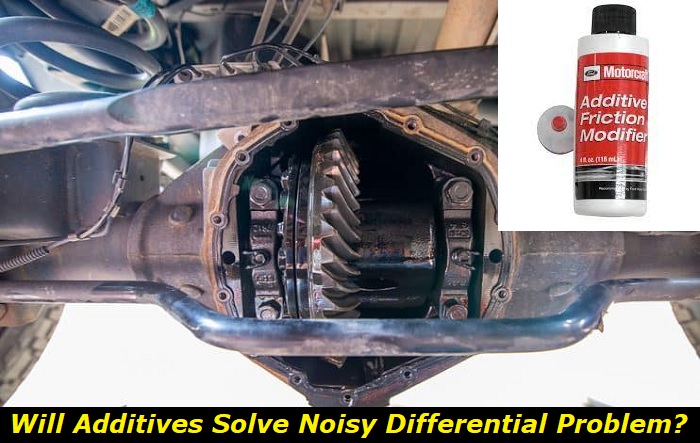Are you experiencing a noisy differential in your car while you are driving? Have you been advised to get an additive to help you improve the lubricant performance of the base oil of your car engines? Perhaps you are currently acting on the advice and searching for the best additives out there to minimize or completely eliminate the noisy differentials.
While additives marketed as a quick fix can be helpful and reduce or quiet noisy differential, keep in mind that using them also comes with limitations in the sense that they can only address specific differential noise issues. Not all additives are meant to address severe mechanical problems or damages associated with differential noise.

Fret not! This article will give you all you need to know about differential noise and the use of additives to address it. So, I will cover the following in this article:
- What are noisy differentials and their impacts on your car
- What are additives for noisy differentials and their limitations
- Potential risks and side effects of using additives
- The way forward to addressing noisy differentials
- Precautionary steps for differentials health
By the end of the article, you should better understand what differential noises are and if using additives to reduce or eliminate them is the best way forward.
Understanding noisy differentials
To understand the issue at hand completely, let us start by explaining what differentials are and their role in your car. Simply put, differentials are mechanical devices that mainly transfer the engine's power to the wheels while allowing them to spin at different speeds when you turn corners.
For instance, your car's outside wheel will spin faster than the inside wheel when traveling around corners because you are traveling a longer distance. However, you may face noisy differentials in the long run for several reasons, such as wear and tear and lack of lubrication.
The impact of noisy differentials
Without a doubt, a noisy differential can be annoying, especially when you are on a long journey. Apart from noisy differentials affecting your comfort and enjoyment while driving your car, it also warns you of underlying problems. Given that the noises produced can serve as distractors, they can simultaneously affect your handling and drive.
When you notice sounds or noises associated with differentials, do not ignore them, as they can further cause more damages to your car which can call for costly repairs. Considering both effects on your car and your safety, it is best to diagnose your car to figure out the actual problem and fix it as soon as possible. In the next section, we will discuss additives and their use to mitigate noisy differentials or eliminate unwanted sounds in your car.
Exploring additives for noisy differentials
Additives specifically formulated for noisy differentials are marketed as a quick fix to reduce or eliminate unwanted sounds your car produces. These are advanced additives formulated with molybdenum compounds and fatty acids, "i.e., friction modifiers, detergents, or other substances" to minimize friction between differential metal parts.
These additives are meant to improve lubrication, reduce friction, and minimize noise so that the metallic parts of your car differential won't grind far too much. They allow you to drive your car more quietly and smoothly without hauling noise.
You will often see additives manufacturers claiming their products can solve differential noise issues. Well, we can't say differential additives are not good; as a matter of fact, they seem promising solutions and are advised to be used.
Additives can benefit a noisy differential in different ways, such as aiding in lubricating the metal components, minimizing friction, and avoiding wear and tear. However, it is important to know that they have their limitations. In the next section, read on as we discuss the limitations of using additives to minimize or quiet a noisy differential.
The limitations of additives
While differential additives may seem like a promising solution, it is crucial to understand their limitations. Additives can sometimes or only provide temporary relief by reducing the noisy differential instead of resolving the underlying issue.
Additives can only address certain types of differential noise, typically associated with mild wear or lubrication issues. They are ineffective in addressing more severe mechanical problems or damages that may be causing the noise. If the noise is caused by significant mechanical issues such as damaged gears, or other internal damages, additives cannot rectify these problems.
Moreover, addictives may alter the properties of the lubricant or introduce friction modifiers to reduce the noise temporarily. This implies that additives are not a cure-all for all differential problems. It is important to identify the root cause of the noise before assuming that an additive will solve the problem.
Potential risks and side effects
Using additives for noisy differentials also comes with certain risks and side effects. In some cases, additives may temporarily mask the noise without addressing the underlying issue. There have been instances where the use of additives worsened noise or even damage to the differential system. Therefore, it is essential to exercise caution and consider potential risks before using additives as a solution.
People often ask if using gear oil for noisy differentials is appropriate. You should never fill your car differential with gear oil because doing this chokes up the gears and needs a complete rebuild. To get the most out of the additives, use the proper addictive in the proper application.
The way forward to address and prevent noisy differentials
There are three kinds of people: those who get their car serviced regularly, those who wait until they hear some engine noise and do need service immediately, and those who hear and choose to keep on driving until they need roadside assistance.
Many delays in seeing a mechanic until their car's problem gets worsen, but instead of trying to get the problems fixed at once, it is far better to do what you can to avoid getting your car damaged in the first place. Why? Because prevention is better than cure.
So, the only thing you can do to minimize your chances of needing additives for a noisy differential is to keep up with your car's regular service. Once you notice that your car differential is noisy, do not hesitate to seek a professional who can help you diagnose and repair it.
Again, regular maintenance practices are essential to maintain a healthy differential system and minimize the chances of encountering noise issues. All you need to do is;
- Check and change the oil regularly
- Maintain appropriate oil levels, and
- Adhere to the manufacturer's recommended service intervals
By prioritizing these preventive measures, you can help extend the life of your car differentials and reduce the chances that you will have noise-related problems.
Wrap up
In conclusion, if you are considering the additives to mitigate or eliminate noisy differentials of your car, you may find this article helpful after reading through it. We have discussed what additives are, their usage and limitations, and the precautionary and post-cautionary steps to take when you notice that your car differentials are making unwanted sounds.
While it may be tempting to consider additives as a quick fix for noisy differentials, they are only a guaranteed solution for some cases. As we said earlier, additives have their limitations and potential risks, and they may not effectively address the underlying mechanical issues causing the noise in your car. The best you can do is to consult a professional mechanic with experience to ensure accurate diagnosis and repair.
By following and doing these, you are on track to navigate the complexities of noisy differentials of your car and find a suitable solution to restore a quiet and smooth driving experience. Always keep in mind that a healthy differential system is important for your vehicle performance and driving enjoyment.
About the authors
The CarAraC research team is composed of seasoned auto mechanics and automotive industry professionals, including individuals with advanced degrees and certifications in their field. Our team members boast prestigious credentials, reflecting their extensive knowledge and skills. These qualifications include: IMI: Institute of the Motor Industry, ASE-Certified Master Automobile Technicians; Coventry University, Graduate of MA in Automotive Journalism; Politecnico di Torino, Italy, MS Automotive Engineering; Ss. Cyril and Methodius University in Skopje, Mechanical University in Skopje; TOC Automotive College; DHA Suffa University, Department of Mechanical Engineering






Add comment